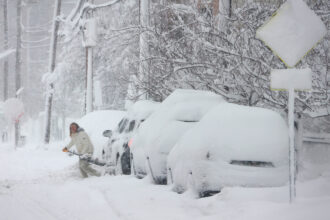Court Decision Threatens to Unravel EU Carbon Market (EurActiv)
In a decision that threatens to scupper Europe’s cap and trade scheme, the Court of First Instance annulled the European Commission’s decision to lower the carbon emission quotas of Estonia and Poland.
Hu’s Carbon Commitment Marks New Era for China (Reuters)
Buried amid stodgy language and recycled commitments to cleaner energy was China’s first recognition of a responsibility the rest of the world has long urged it to shoulder — that of counting and curbing its emissions of greenhouse gases.
New Zealand’s New Carbon Laws Set for Safe Passage (Reuters)
New Zealand officials brought their revised carbon emissions plan before parliament today, confident of enacting it before the Copenhagen meeting. The revision covers all sectors but increases subsidies to industry and offers price caps on the cost of carbon.
US Nuclear Power Panel Shifts Focus to Reusing Fuel (New York Times)
A U.S. advisory panel that spent 20 years studying a proposal for a nuclear waste repository at Yucca Mountain has turned to discussing ways of reusing the fuel instead.
Nicholas Stern: Optimistic as China and India Lead the Way (Guardian)
This week’s summit on climate change offered cause for confidence, but all nations now need to redouble their efforts, writes British economist Nicholas Stern.
Caterpillar, FedEx CEOs Prefer Carbon Tax (Bloomberg)
The chief executives of Caterpillar and FedEx say they prefer a tax on carbon dioxide emissions and criticized the cap-and-trade measure being debated in Congress.
PNM Resources Quits US Chamber Board (NRDC)
In yet another blow to the credibility of the US Chamber of Commerce, PNM Resources announced that it has given up its seat on the Board of Directors, criticizing the Chamber’s stance on global warming.
Spain’s Answer to Unemployment: Go Greener (Washington Post)
Spain’s government envisions a new army of engineers and technicians nurturing windmills and solar farms. It’s starting with energy efficiency projects that could redeploy up to 80 percent of the million construction workers here who lost their jobs in 2008.
Provocative Study Warns of Planetary Boundaries (Yale Environment 360)
The Earth has nine biophysical thresholds beyond which it cannot be pushed without disastrous consequences, the authors of a new paper in the journal Nature report. Ominously, they say, we have already moved past three of the tipping points.
Cooling Breakthrough for Computers, Car Electronics (CNet)
Researchers at Purdue University have had a breakthrough that may change how engineers design cooling systems in everything from computers to electric and hybrid cars.
Chevron takes Ecuador fight to trade arbitrators (Reuters)
Chevron Corp says it has filed an international arbitration claim against Ecuador, opening a new front in its defense against a $27 billion environmental damage lawsuit in Ecuador.
BP Pays $1.7M For Lack of North Slope Spill Protection (Anchorage Daily News)
BP Exploration Inc. has paid $1.7 million to the state due to inadequate oil spill protection measures at Prudhoe Bay and other North Slope oil fields, state officials announced.
ConocoPhillips’ Devious Opposition to US Climate Bill (Guardian)
The green mission statements made by the US energy firm ConocoPhillips amount to nothing when it dirties its hands with tar sands and campaigns against Obama’s climate bill in such devious ways.
Solar Paint Could Make Those White Roofs Even Better (CleanTechnica)
Technology will soon allow us to use a specialized paint to collect rooftop solar energy. Could this be the answer to neighborhood Christmas light wars?
About This Story
Perhaps you noticed: This story, like all the news we publish, is free to read. That’s because Inside Climate News is a 501c3 nonprofit organization. We do not charge a subscription fee, lock our news behind a paywall, or clutter our website with ads. We make our news on climate and the environment freely available to you and anyone who wants it.
That’s not all. We also share our news for free with scores of other media organizations around the country. Many of them can’t afford to do environmental journalism of their own. We’ve built bureaus from coast to coast to report local stories, collaborate with local newsrooms and co-publish articles so that this vital work is shared as widely as possible.
Two of us launched ICN in 2007. Six years later we earned a Pulitzer Prize for National Reporting, and now we run the oldest and largest dedicated climate newsroom in the nation. We tell the story in all its complexity. We hold polluters accountable. We expose environmental injustice. We debunk misinformation. We scrutinize solutions and inspire action.
Donations from readers like you fund every aspect of what we do. If you don’t already, will you support our ongoing work, our reporting on the biggest crisis facing our planet, and help us reach even more readers in more places?
Please take a moment to make a tax-deductible donation. Every one of them makes a difference.
Thank you,











